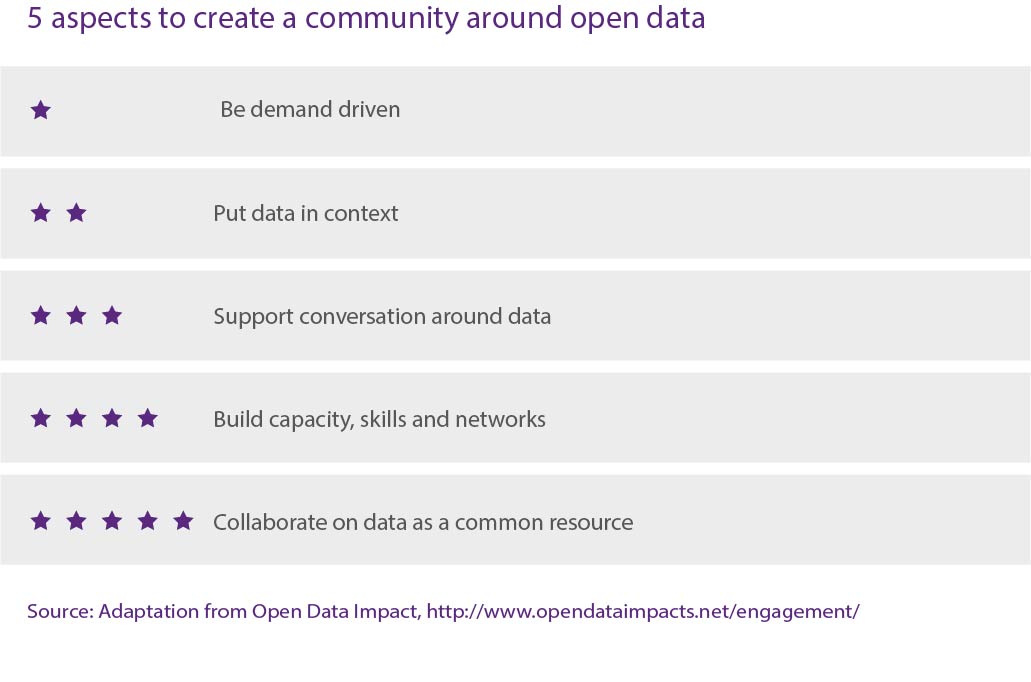The ecosystem that nourishes open data
Fecha de la noticia: 22-12-2017

On too many occasions, open data initiatives are born in governments as purely technical projects whose purpose is simply creating a data catalog, when, in reality, they should be seen as collaborative transformation projects that take place within complex and variable environments, in which the ultimate purpose is not entirely clear and the coordinating entities - the public administration in this case - do not have all the resources to generate the necessary change by themselves.
In fact, in order to exploit its full potential, open data must be able to count on a healthy and balanced ecosystem that sustains and nourish it. The data will be no more than the common platform on which this ecosystem supports and which provides the raw material necessary for it to nourish and evolve.
Therefore, one of the keys to the success (or failure) of any open data initiative will be its ability to create and evolve an active community of users around published data, establishing permanent communication and collaboration mechanisms that enable processes of feedback and co-creation throughout the process.

It is also important that these processes are established for the multiple actors that should be part of that ecosystem:
-
Public sector: including all levels of the administration and whose role will be to provide political support, ensure long-term sustainability, provide strategic direction at the highest level, guide implementation, create standards, set the agenda or give support.
-
Non-governmental organizations: focused mainly on using data as a tool for their different activities, raising awareness about the real value behind data, monitoring relevant policies and demanding greater data availability and participation guarantees.
-
Civic hackers: they will use their most technical knowledge to transform the data and make sense for the different audiences.
-
Media: whose role is to use data to inform, do investigative journalism and tell stories through data that reaches citizens more directly.
-
University and Research institutions: using data not only to develop theoretical concepts and frameworks, but also applied research to create new products and services through data and innovation.
-
Private sector: generating value and business based on data, providing the necessary data infrastructures, collaborating to facilitate opening processes and contributing their own data to enrich the ecosystem.
And given that the key is in the ecosystem, how will we then build a successful ecosystem? For example, we can look at the ten lessons shared by pioneers of the Internet, the largest and most successful social ecosystem to date thanks to collaboration:
- Let everyone play: attract new resources and generate new ideas.
- Play nice: a common mistake will be to reduce potential participation by putting serious barriers to entry to avoid low quality contributions, vandalism, etc.
- Talk about what you are doing while you are doing it: improve understanding and participation, avoid overlaps and build trust.
- Use multiple channels of communication: do not focus solely on the Web.
- Give it away: do not reserve what you know and learn.
- Reach for the edges: you will need that vision when the most complicated problems appear.
- Make it work, then make it better: you will need the participation of everyone with different interests and incentives.
- Design for participation: divide the work into manageable tasks that are easy to do and invite to get involved.
- Increase network impact: a community model based on a network of nodes that interact with each other will lead to exponential growth.
- Build platforms: help people and organizations coordinate so they are more productive together.
“If you focus on avoiding people to make wrong things (with data), you will also avoid them to make right ones", – Jimmy Wales, Wikipedia cofounder.











